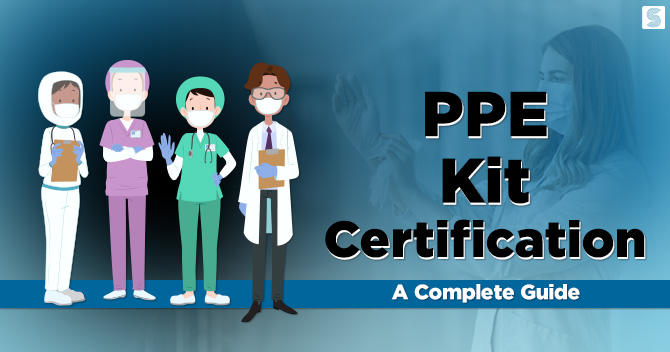PPE Kit Certification: A Complete Guide

Shivani Jain | Updated: Jun 29, 2020 | Category: Business
Since the COVID-19 epidemic, the inadequate supply chain for personal protective equipment (PPE) has proved to be a significant issue. India, which was earlier not producing any kit, has achieved a target of producing 2.06 lakh kits daily. In this blog, we will talk over the concept of PPE Kit Certification and the guidelines issued by the various Ministries.
Table of Contents
Concept of PPE Kit
PPE is an item of protective clothing worn by an individual to prevent contact with an infectious agent or body fluid. In the Medical sector, these kits are used by doctors, nurses, and various health care personnel.
These PPE Kits act as abarrier between the healthcare worker and infectious agents or body fluids. Therefore, it reduces the risk of COVID-19 spread. Further, the main components of this kit are Face-shields, Googles, Body Suits, Shoe Covers, Head Covers.
Benefits of Personal Protective Equipment
In India, the benefits of a Personal Protective Equipment can be summarised as:
- Prevention from Exposure: A Personal Protective Equipment acts as a blockade and controls the spread of the harmful virus. That means it prevents the exposure of infectious materials, which can cause damage and illness to the body.
- Minimises the Risk: In case of an airborne bacteria, this kit will help in reducing the risk of respiratory diseases.
- To prevent the spread of Potentially Infectious Materials: This kit acts as lifesaver equipment. The reason for the same is that it averts the growth of bacteria and germs from one individual to another. For instance, the dentist often wears headgear during treatment to protect themselves from getting diseased from bacteria.
Things to Remember While Using PPE
In India, the points to consider while using PPE can be summarised as:
- Every Person must follow proper cleaning and hygiene as PPEs cannot serve as a substitute to preventive public health measure;
- Every person needs to follow social distancing. The term “social distancing” means that one person needs to maintain at least 1 metre distance from another person;
- Every person needs to follow adhere to the protocol laid down by the authorities for getting rid of PPEs. Moreover, the guidelines regarding the prevention of infection, disposal of glovesare available on the official portal of MoHFW [1] .
PPE Kit Certification
Recently, the Ministry of Textile [2] has issued several guidelines for the manufacturing unit and testing centres of PPE. The purpose of these guidelines was to streamline the process of testing and manufacturing. And also aim at ensuring the quality of PPE coveralls.
Further, the Ministry of Health and Family Welfare has issued some guidelines for healthcare workers. Healthcare workers include professionals working in Quarantine Centres, Laboratory, Primary Health Care, Community Setting. These guidelines talk about the different types of PPEs and their use in various settings.
Testing and Certification of Samples
In India, the INMAS has been assigned the responsibility to test the PPE full body or notified body coverall samples submitted. INMAS stands for the Institute of Nuclear Medicine and Allied Services. The test conducted by the INMAS is known as the “Synthetic Blood Penetration Resistance Test”.
Specifications of PPE Products
In India, a company after obtaining the PPE Kit Certification needs to provide the PPE Products as follows:
- Gloves: The specification for the quality of gloves are as follows:
- Nitrile;
- Non-sterile;
- Powder-free;
- Outer gloves must reach mid-forearm (a minimum 280 mm total length)
- Available in Different sizes.
- Coverall: The specifications for the quality of Coveralls are as follows:
- Resistant to blood and body fluids;
- Single-Use;
- Avoid black colour;
- Must be in light colours as they help better in noticing possible contamination;
- Finger or Thumb Loops to anchor sleeves in place;
- A Quality Complaint about the ISO 16603 class 3 exposure pressure.
- Googles: The specifications for the quality of googles can be summarised as:
- Well-fitting transparent and zero-power glasses;
- Adjustable Holders on all sides;
- A Flexible frame that fits easily to all face types without using much of a pressure;
- Must cover full eyes and the surrounding areas;
- Fog-resistant;
- Scratch-resistant;
- Band with an adjustable feature that does not loose while carrying outthe clinical activity;
- Indirect venting that helps in minimising fogging;
- Re-usable or disposable material;
- A Quality Complaint about the standards given below:
- EU (European Union) standard directive 86/686/EEC, EN 166/2002
- ANSI/SEA Z87.1-2010.
- N-95 Masks: The specifications for the quality of N- 95 Masks can be summarised as:
- Mask must not shrink;
- High filtration efficiency;
- Passage of oxygen is efficient with expiratory valve;
- A Quality complaint about standards for the medical N-95 respirator:
- NIOSH N-95, EN 149FFP2.
- Must be fluid resistant, i.e., it must have a minimum 80mmHg pressure based on ASTM F1862, ISO 22609.
- Shoe Covers: The specifications for the quality of Shoe Covers can be summarised as:
- Must be made of same fabric and material as coverall;
- Must cover the entire shoe;
- Should reach above ankles.
- Face Shields: The specifications for the quality of Face Shieldsare as follows:
- Must be made of clear plastic;
- Must providegood visibility to both the patient and wearer;
- Adjustable band to attach easily around the head and fit comfortably against the forehead;
- Fog-Resistant;
- Easily covers the length and sides of the face;
- Re-usable or Disposable;
- Quality Complaint about the standards given below:
- EU (European Union) standard directive 86/686/EEC, EN 166/2002;
- ANSI/SEA Z87.1-2010.
Requirements of CE Marking
Normally, the manufacture is under an obligation to assure conformity with all the prescribed requirements. The term “requirements” means that the PPE Kit must meet EU Directives. However, a manufacturer does not need to comply with EU Directives if it has obtained CE Marking. In India, the requirements for obtaining CE Marking are as follows:
- The manufacturer must have a complete understanding concerning EU requirement for the PPE product;
- The manufacturer must verify that the products are being produced as per the norms of relevant EU requirements;
- All the products must be tested and checked by a Notified Body;
- Examine all the PPE products;
- The manufacturer must check that all the products have successfully fulfilled the technical requirement;
- The manufacturer must affix the CE marking on the PPE Product;
- The manufacturer must sign an EU (European Union) declaration of conformity.
Validity Period of CE Certification
A CE Certification remains valid for a period of three years. This certificate is issued by the Notified Bodies. However, the validity period is one year for the devices having high risk. The status of CE Marking depends on the quality system certification.
GMP Certification
GMP (Goods Manufacturing Practises) certification deals with the manufacturing of natural and pharmaceutical products manufacturing. These guidelines are made to make sure that the products are safe to use and comply with quality standards. Further, GMP Certification includes production aspects, initial material, equipment, premises, etc. Moreover, these guidelines also deal with safety, health, and hygiene maintenance.
Principles of GMP Certification
The principles of GMP Certification can be summarised as:
- The Manufacturing processes must be clearly defined and controlled;
- Any changes concerning the manufacturing processes must go under examination and evaluation;
- The procedures and instructions of manufacturing must be free from uncertainty and ambiguity;
- Theoperators must have received the training in a prescribed way, i.e., a way in which they are able to carry out document procedures.
Conclusion
The face masks and PPE kit certification need to undergo the certification of CE, GMP. These medical products must adhere to the guidelines prescribed under the process of certification and approval.
Also, Read:How to Get BIS Registration Certificate in India?














